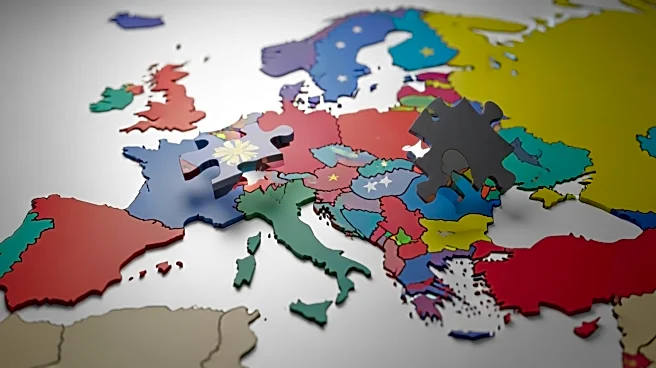What's Happening?
The European Union (EU), a political and economic alliance of 27 countries, has been grappling with several challenges to its unity in recent years. These include the aftermath of Brexit, the ongoing refugee
crisis, and disagreements over further integration. The EU, which was founded in 1992, has its origins in post-World War II efforts to integrate European economies and prevent future conflicts. It consists of seven major institutions that make laws, coordinate foreign affairs and trade, and manage a common budget. The EU has been tested by various crises, including the 2008 global financial crisis, the COVID-19 pandemic, and most recently, the Russian invasion of Ukraine. These events have strained the EU's cohesion and prompted debates over its future direction.
Why It's Important?
The challenges facing the EU have significant implications for global politics and economics. The EU is a major player on the world stage, and its ability to maintain unity affects its influence in international affairs. The bloc's response to crises, such as the Russian invasion of Ukraine, has highlighted the importance of a coordinated foreign policy. Additionally, the EU's internal debates over integration and expansion impact its economic stability and the effectiveness of its policies. The EU's handling of these challenges will determine its future role in global governance and its ability to promote peace and economic growth in Europe.
What's Next?
The EU is likely to continue facing debates over its integration and expansion policies. Member states will need to navigate differences in national interests to maintain cohesion. The bloc's response to external threats, such as Russian aggression, will also be crucial in shaping its future. The EU may need to strengthen its foreign policy and defense capabilities to address these challenges effectively. Additionally, the EU's approach to economic recovery post-COVID-19 and its handling of the refugee crisis will be key areas of focus in the coming years.
Beyond the Headlines
The EU's challenges highlight deeper issues related to sovereignty and integration. The bloc's ability to balance national and collective interests is a central theme in its ongoing evolution. The EU's approach to sovereignty-sharing, particularly in areas like trade and foreign policy, will continue to be a contentious issue. The bloc's efforts to promote democratic values and economic stability in its member states are also critical to its long-term success.










